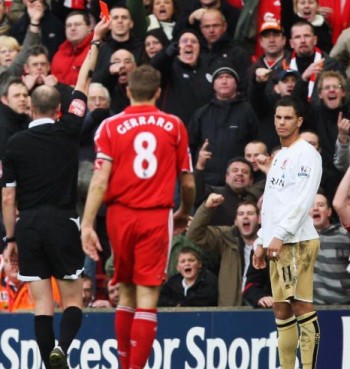|
The contrast with the astonishing events of two weeks ago, in which Cardiff's Darren Purse firstly launched an ugly attack on Andrew Cole before incomprehensibly having that decision overturned on appeal, could hardly be more stark. One manager opted to act with dignity and restraint in the face of an apparent injustice. Dave Jones sought to launch an aggressive assault on both Cole and the referee who made the decision. Jones' approach paid dividends; Southgate's palpably did not.
Leaving aside the self-evident absurdity by which Cardiff are governed for disciplinary matters by a self-serving and parochial governing body who are now responsible for only two league clubs, the contrasting stories of those two incidents is of serious consequence. In March, the FA launched its Respect agenda in a bid to improve conduct towards referees. If it is to succeed, it must ensure that those within the game who refuse to publicly criticise officials do not lose out as a result.
Jones is not the only manager who uses such aggressive tactics towards referees: Sir Alex Ferguson has been doing it for years and provided a prime example following Manchester United's defeat to Portsmouth in this season's FA cup. Such tirades are usually issued thoughtlessly out of frustration or as excuses behind which players can hide, which in itself indicates that the penalties currently in place to deter such behaviour are utterly ineffective. At worst, they are issued as a calculated ploy to try and influence future decisions.
Ferguson is a prime example, but he is not alone. With very few exceptions - the best being Southgate and Stuart Pearce - football managers point the finger at officials all too quickly. Owen Coyle did so a week last Sunday after watching his side turn in an utterly abject performance at Selhurst Park. However far offside Scott Sinclair may or may of not have been when he seized upon schoolboy defending to win that seventh minute penalty, Burnley's inability to defend and general lack of interest was such that, had the assistant flagged, it would have only delayed the inevitable. With the result almost certainly unaltered, there was absolutely no need to discuss the topic.
It is all to easy to cite other sports as examples which football should follow, but it is a fact that in Rugby and Cricket, there is simply no culture of using referees as a shield behind which to hide ineptitude, nor of waging psychological warfare towards officials. If the FA is as serious as it should be about imposing respect towards referees in football, it has to replicate that attitude.
It can only be presumed that it is not quite that serious, or else it would have imposed its agenda across the game as a whole, rather than engaging in a spot of play ground bullying and opting to target the bottom end of the pyramid. If poor conduct is to be stamped out, then highly paid professional players who show dissent towards referees must be rewarded with draconian punishments. Unless the professional game sets a precedent, then the perception will remain that disrespect is appropriate.
But whilst flurry of red and yellow cards at the slightest hint of dissent might be the only way to communicate the message to the petulant individuals who play the game, it will not alone be sufficient to provoke the necessary change in attitude. Until referees are properly supported off the pitch, they simply do not have a prayer of re-imposing their authority upon the game.
It will not happen for as long as referees who make a bad call are subject to Keith Hackett's highly public policy of dropping them for the subsequent round of Premier League matches. Other than to act as a sop to loud-mouthed managers and a blood-thirsty media, it achieves nothing.
It is certainly not an example of accountability in action, as Hackett nonsensically suggests: accountability and the assessment of referees is rather better done over the course of a full season, absorbing any gaffes within the perspective leant by 35 to 40 games. In the meantime it seems reasonable to publicly support officials in every way possible and to discourage anyone involved in the game from portraying referees as scapegoats for defeats.
|
But that support also involves ensuring that there is no reason for managers and coaches to believe they have anything to gain from berating referees, or indeed - and perhaps more pertinently - for them to believe they have anything to gain from refusing to engage in those scathing attacks. Perhaps, once a manager is deemed to have criticised an official in public, his club should forfeit their right to appeal any incident within that match. And to compliment that, it is time that managers who attract censure for their post-match comments were banned not only from the touchline during forthcoming games, but from the entire stadium, including the dressing room.
Dramatic? Perhaps. But it is the only way to overcome what is an entirely futile culture. It is all very well bemoaning a decline in the standards of refereeing, but even if it is true, there is little that can be done about it, unless of course individuals start falling over themselves to take up the job and do it better - in which case no-one is likely to stand in their way.
Yet with the number of referees in ever-increasing decline - 7,000 have given up the role this year alone - that hardly seems likely. Meanwhile, the hype-fuelled drive to improve standards has resulted in an emphasis on fitness and on youth which has only served to force good referees out of the game when they still have the intelligence and experience to make correct decisions.
As such, it has been entirely counter-productive. And that ought to provoke the FA to consider the question raised by the Darren Purse affair, even if the incident does not currently come within its jurisdiction: if we do not promote the authority of officials off the pitch, then can we really expect them to do so on it?


